The final chapter of the 2023 Rugby World Cup has been written, and the Springboks can rest easy, knowing they have another four years with the Webb Ellis Cup, after a nerve-jangling 12-11 win over their fiercest rivals, New Zealand. In the 48th and final game, there were notable individual performances all over the park, but over the course entire tournament, there were regular moments of disbelief and awe over the skills displayed by the 660 players at the tournament.
Picking a world’s best XV from France in an unenviable task but RugbyPass has attempted to whittle down those players into an orderly fashion before the tournament is packed away until Australia in 2027.
Backs
- Hugo Keenan (Ire)
Keenan entered the Rugby World Cup as one of the most complete full-backs in world rugby and left with his reputation untarnished from the breathtaking quarter-final exit against the All Blacks. Ireland were able build phase upon phase because of Keenan’s reading of the backfield for signs of trouble, as ‘the Fox’, regularly mopped up kicks and set off on lung-busting counter attacks, when cutting stylishly into the line. He added his 11th and 12th Test tries against Romania and Scotland, as his aerobic fitness, aerial-ability and game intelligence shone through.
Silver: Thomas Ramos
A superlative striker of the ball from hand and off-the-deck, Ramos was France’s third playmaker behind Antoine Dupont and Matthieu Jalibert.
Bronze: Beauden Barrett
At 32, still a classy operator and his chip over the top of the Irish defence to regather and finally put Leicester Fainga’anuku away for a score, showed him at his innovative best. Scorer of the only try in the World Cup final was fitting for a legend of the game.
- Will Jordan (NZ)
Will Jordan has been a delight to watch. At 6ft 2ins, he glides over the turf, and is an elegant finisher, as we saw most vividly against Ireland. He possesses the top-end speed of a genuine Test class winger and his 70m effort against Argentina took the breath away. A joint-record eight tries in the tournament is some return and he now has 30 tries in 32 All Black appearances. Now firmly established as one of the world’s premier players.
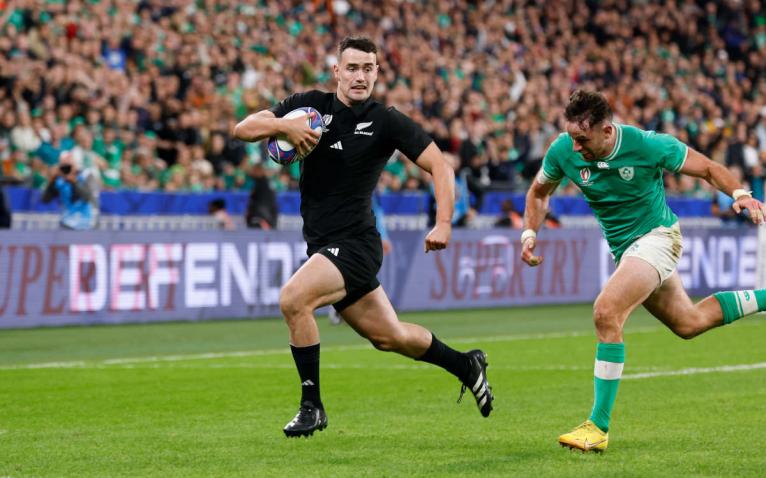
Silver: Damian Penaud (Fra)
Penaud had a fine tournament until the quarter-final, making 13 clean breaks and running in five tries, to bring him within two of Serge Blanco’s 37-try French record at just 26, but he was outplayed by his opposite number, Kolbe against the Springboks.
Bronze: Louis Rees-Zammit (Wal)
Five tries in four games is hard to criticise. Rees-Zammit acquitted himself well, and the Gloucester wing in full-flight is one of rugby’s finest sights.
- Garry Ringrose (Ire)
The complete outside-centre, Ringrose had a superlative tournament, marshalling the defence and allowing Bundee Aki to punch holes inside him, knowing the Leinsterman had him covered. Ringrose also showed his carrying prowess with 47 runs during the tournament, where he excelled with his dominant carries. A defensive leader under Andy Farrell, his footballing skills were on show against Scotland, and his scything break against Scotland to put Mack Hansen away set the tone of a statement win.
Silver: Jesse Kriel (SA)
Kriel has been a revelation in the 2023 tournament. Seen as a Swiss Army knife in the Bok backline with the Rolls Royce Lukhanyo Am in situ, with Lam out, Kriel has been monstrous in defence and has the pace to hurt defences when in space. Emerged at the end of the tournament with his reputation enhanced.
Bronze: George North
The old campaigner, George North (Wal), crossed the whitewash against Fiji and Australia, and now has 49 Test tries. A shrewd defender and has taken on far more leadership duties.
- Jordie Barrett (NZ)
The question is not what can Jordie Barrett do, but what can’t he do? The 6ft 5in younger brother of Beauden and Scott, can hoof the ball prodigious distances, truck it up the middle to carry over the gainline, offload dextrously as we saw in the final, and clatter attackers backwards, as Nicolas Sanchez will attest. A running threat in the close-quarter exchanges inhabited by 12s, Barrett was fundamental to the All Blacks coming within a point of lifting their fourth World Cup trophy.
Silver: Bundee Aki (Ire)
Aki enjoyed an extraordinary tournament, where his power-running was simply too hot to handle for every defence he came up against. At 33, he seems to have improved with age and he’s earned another two year deal with the IRFU.
Bronze: Damien de Allende (SA)
A toss of a coin with France’s Jonathan Danty, de Allende’s power through contact was to the fore in the classic against France and his muscular interventions in defence and slowing the game down were integral to the Boks.
11. Cheslin Kolbe (SA)
Kolbe has, by his own standards, had a relatively quiet few years after his broken-field running lit up the 2019 tournament, but big tournaments need big-name players to step up and Kolbe didn’t disappoint. His pace to out flank the rapid Damien Penaud saw him run in unopposed against France and of course his never-say-die attitude to charge down Thomas Ramos’ conversion was the difference between the two in the quarter-final. Kolbe was similarly inspired during the Final, propelling Will Jordan backwards, kicking with intelligence and flattening Aaron Smith. Kolbe is a multiple-threat. His varied kicking game, ability to find space in heavy traffic and robust defence for a man of modest proportions mark him out as a player of rare gifts.
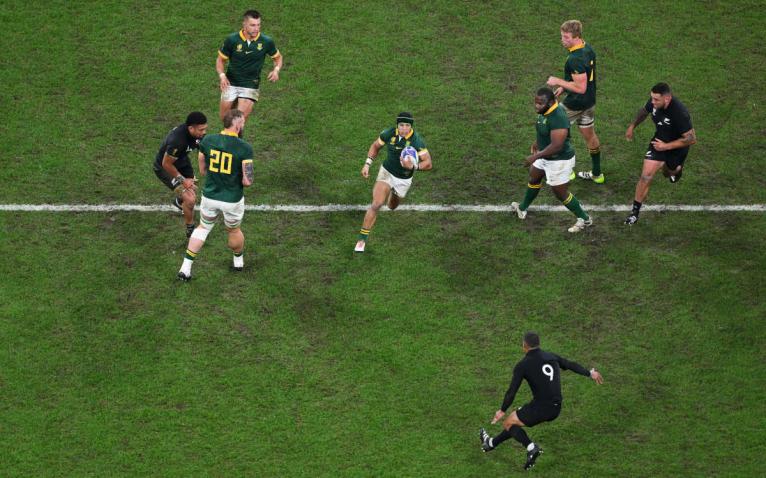
Silver: Mark Tele’a (NZ)
Not the biggest wing but the Auckland Blue has the rare ability of being fiendishly difficult to bring down. Shone in the Rugby World Cup final, carrying for 60m with precious little space to work. A class act.
Bronze: Mateo Carreras (Arg)
Modest in size, but immensely powerful, Carreras scored a hat–trick against Japan and run rings round defenders or run right over them, as he did with George Ford and Marcus Smith in the bronze-medal final.
- Matthieu Jalibert (Fra)
When Romain Ntamack was injured during the warm-ups, France mourned the absence of a dashing and debonair 10, but luckily the cocksure 24-year-old Bordeaux-Begles Jalibert was able to seamlessly slip into the playmaker role and orchestrated a French backline that navigated a compelling win over the All Blacks and tormented Namibian and Italian defences. One sublime cross-kick to Damian Penaud against Italy was a highlight.
Silver: Richie Mo’Unga (NZ)
Mo’Unga forgot to pack his kicking boots in the semi-final against Argentina, missing four of his seven conversion and inexplicably going on his own when Will Jordan had a run in, but Mo’Unga broken-field running, most vividly in his jinking break to put away Jordan in the quarter-final against Ireland will live long in the memory.
Bronze: Handre Pollard (SA)
Cometh the hour, cometh the man. Pollard was a late arrival in France but his impact was gargantuan and his place-kicking ensured South Africa emerged victorious by one-point in the knockout stages with a series of clutch kicks. Narrowly edges out Owen Farrell, who ended the tournament as top scorer with 75 points.
- Aaron Smith (NZ)
Smith will depart the Test stage a bonafide legend. Four tries, one a breathtaking individual effort against Argentina, show the 124-cap Kiwi has few peers. His service from the base, energy and rugby smarts belie the fact he turns 35 in a matter of weeks. In a ‘Dupont era’ his talents as one of the greatest 9s to take to the field shouldn’t be discounted.
Silver: Faf de Klerk (SA)
Used sparingly with four scrum-halves selected by the Springbok management but when South Africa were in a hole, de Klerk delivered and his stripping of Dorian Aldeghiri in the breathless closing minutes against France, was match defining. De Klerk also made a series of crucial turnovers against the All Blacks in the final.
Bronze: Antoine Dupont (Fra)
The expectation on Dupont, as the face of the World Cup, was ‘enorme’, but he handled it with aplomb and his performance against the All Blacks on the opening night was composed and clinical. Despite breaking his cheekbone, his influence against South Africa was huge, with respected statistician Ross Hamilton reporting that he still handled the ball on 105 occasions (with the next most of any other player, 33), and made the most passes, carries and kicks. At 26, he should still be at the peak of his powers in 2027
Forwards
- Ox Nche (SA)
A simple question. Would South Africa have made the World Cup final if Ox Nche hadn’t been introduced in the 49th minute against England? Simple answer. No. Nche destroyed the scrummaging of Kyle Sinckler and Ellis Genge, winning a plethora of key scrum pens. His low centre of gravity, flexibility and barrel chest allow him to drop bigger tightheads until they fold. Along with Steven Kitshoff, the best loosehead double-act in world rugby.
Silver: Andrew Porter (Ire)
Able to play on both port and starboard in the front row, Porter’s strength at the set-piece and in the loose mark him out as the prototype for a modern-day prop.
Bronze: Angus Bell (Aus)
Sifting through the wreckage of Australia’s disastrous World Cup venture, it’s been difficult to find positives, but the emerging presence of the 6ft 3in, 124kg Waratahs loosehead gives the Wallabies hope. Superb against Fiji and Georgia, the 23-year-old is some talent.
- Peato Mauvaka (Fra)
When Julien Marchand’s hamstring twanged on the opening night of the World Cup, many at the Stade de France panicked over the loss of the outstanding Toulouse hooker. They needn’t have worried. Up stepped his club colleague Mauvaka. His performance against South Africa was one of the standout individual showings in the entire tournament, as he skittled South African’s, carrying for 95m, showed his footballing prowess and chopped down Boks for nearly 80 minutes. The battle between Marchand (28) and Mauvaka (26) for a starting shirt will propel both players to new heights.
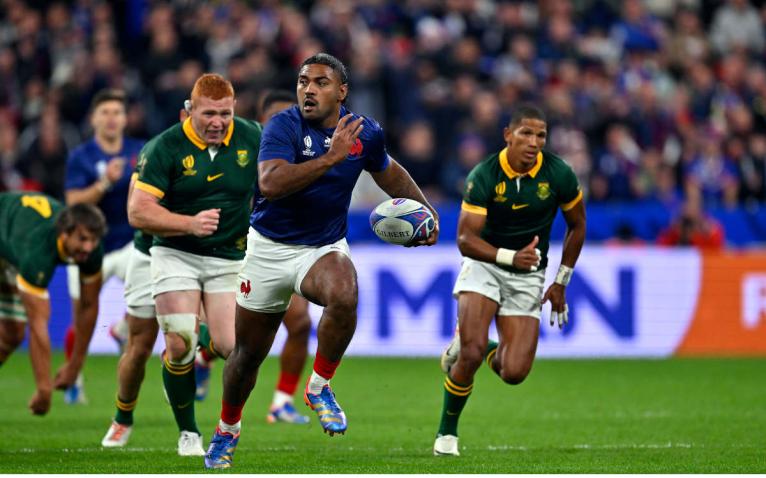
Silver: Jamie George (Eng)
An ever-present for England during the World Cup. One of the most accurate throwers in the Test game, George also boasts deft handling skills and a turn of pace befitting a former fly-half.
Bronze: Codie Taylor (NZ)
Along with his former Fielding High school team-mates, Aaron Smith and Sam Whitelock, Taylor has enjoyed a strong tournament. Topped the All Black tackle count at the final and carried for 25 metres.
- Frans Malherbe (SA)
Similar in dimensions to double World Cup winner Os du Randt, the 32-year-old from Paarl is the rock upon which the fearsome Springbok pack is built. A few bags of sugar shy of 20 stone, the bearded tighthead’s bread and butter is dominating at the set-piece, not throwing out flashy one-handed offloads or pirouetting through heavy traffic. For that singular use, there are few better in the world game. Ran himself into the ground for 65 minutes in the final.
Silver: Uini Atonio (Fra)
For many of his 57 caps, Atonio has been the sturdily built lighthouse in the French pack, used to lock down the French scrum, but conspicuous by his absence in the loose. That changed at this World Cup as Atonio took on more ball-carrying duties. His best game was against South Africa where he ran until standstill with 11 carries. Now retired from Test duty, he will be sorely missed.
Bronze: Ben Tameifuna (Tonga)
For the heaviest player in the tournament, weighing in at 145kgs, Tameifuna’s durability to go into the final quarter of games, rumble forwards with tacklers hanging off him has been mightily impressive. He had a standing ovation against South Africa after a stellar outing.
- Eben Etzebeth (SA)
In a squad of large humans, Etzebeth pounds the ground like a giant. Indeed, in the most hostile of arenas, his rampaging run against France, to crash over with five defenders clad in blue being swatted off will be an abiding memory at this World Cup. Shortlisted for player of the year, in the final, Etzebeth disrupted opposition ball at the lineout, left Richie Mo’Unga in a heap with a perfectly legal hit early and dominated whenever he took to the field.
Silver: Tadhg Beirne (Ire)
Ireland’s outstanding lock, Beirne showcased his full repertoire during the tournament, with turnovers, offloads, footballing skills and muscular carries. A lynchpin in the engine room for Ireland.
Bronze: Will Rowlands (Wal)
The form of Rowlands ushered the retirement of the great Alun Wyn Jones. The Dragons lock had an outstanding tournament, leading by example with 64 tackles and carrying through heavy traffic without complaint.
- Scott Barrett (NZ)
It takes some player to break up the most capped second-row partnership in Test history, but Barrett has done that over the last six months. The Canterbury Crusader has been sensational around the park with his tackling, carrying and offloading game and was moved to blindside in the latter stages of the World Cup final, which showed his versatility to the All Blacks. With the Test retirements of Sam Whitelock and Brodie Retallick, Barrett will become an integral part of Scott Robertson’s leadership group going forward.
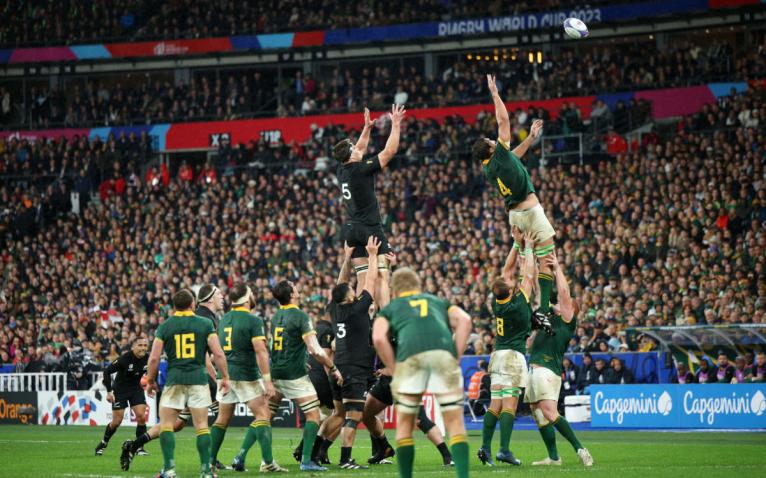
Silver: RG Snyman (SA)
Dubbed by Jake White as a player who could be the ‘best in the world’, Snyman could moonlight in the NBA, where his 6ft 9ins frame and one-handed ball-handling skills would be appreciated. An impact replacement, he scored a vital try against England in the semi-final.
Bronze: Nicolas Martins (Por)
The outstanding Portugal team were spearheaded by the excellence of backrow Martins, who plies his trade in the ProD2 with Soyaux Angouleme. Scouts at more prestigious clubs will surely be seeking his signature.
- Charles Ollivon (Fra)
For a man of 6ft 7ins, Ollivon can shift through the gears, with his giant strides hoovering up the turf in front of him. Seen by many in the camp as the true leader of Les Bleus, the Toulon man has, like Courtney Lawes, turned into an effective proponent of the breakdown steal. Were it not for a Jesse Kriel ankle tap on the big blindside late on in the quarter-final, he could yet have been France’s hero.
Silver: Pieter Steph du Toit (SA)
A consistent cog in the Springbok machine during the tournament, du Toit saved his best game for the Final. Making a record 31 tackles, many of them dominant, he picked up the Player of the Match award and Jacques Nienaber joked that he would tackle a white carrier bag if it was floating across a rugby field. A modern-day great.
Bronze: Courtney Lawes (Eng)
With a glut of England stars bowing out, the common consensus is that it is Lawes, at 34, whom England will miss most. With slick footwork around the ruck, a watertight defence and ability to pickpocket balls on the deck, he will be sorely missed.
- Ben Earl (Eng)
Okay, we’ve shifted Ben Earl onto the openside, rather than at No 8, but there had to be a place found for the explosive Saracen. The most pertinent question is how Eddie Jones ignored his obvious talents for so long. An athlete of rare ability, Earl carried for a staggering 337 metres (with his 60m lung-busting carry against Fiji a highlight), made 80 tackles and beat 25 defenders. He was a force of nature and will surely be a huge part of Steve Borthwick’s plans going forward.
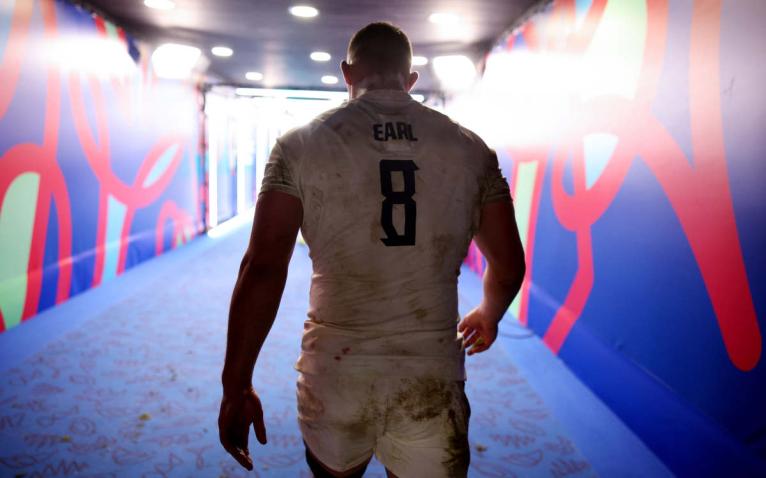
Silver: Jac Morgan (Wal)
Morgan, Wales’ captain had a staggering World Cup. A creator of tries, with a 40m crossfield-kick, a clearer of lines, with a booming ’22-22’, he scored tries, cut opponents down to size and did it all with a the shrug of his shoulders. A modest superstar.
Bronze: Sam Cane
Cane has come in for enough criticism to break a lesser man but his performances in the tournament has been a testament to his character. A titan, defensively and at the breakdown, against Ireland, he continues to prove his doubters wrong. Will cop flak for his red card for a high-tackle in the final, but you hope the critics show a little compassion.
- Ardie Savea (NZ)
Savea’s nomination for Player of the Year has been fully vindicated by his performance at the Rugby World Cup. He has scored three tries, made 47 tackles, 82 carries – the most in the tournament -and made 297 metres with the ball-in-hand, beating 23 defenders. When it comes to big match ‘impacts’ there are few better and the 80-cap All Black and put in a barely-believable all-action performance against the Springboks in the final.
Silver: Gregory Alldritt
An ever-present at the base of the scrum for Les Bleus, the La Rochelle man routinely carries France back over the gainline and gives them front-foot ball. Consistency personified.
Bronze: Taulupe Faletau
Wales went unbeaten in the Pool stages and this was in no small part down to the continued excellence of Taulupe Faletau. A try-saving tackle against Portugal, an all-important bonus point try against the same opponents and sterling contributions against Fiji and Australia were all just a regular day for Wales’ greatest No 8.



Comments
Join free and tell us what you really think!
Sign up for free